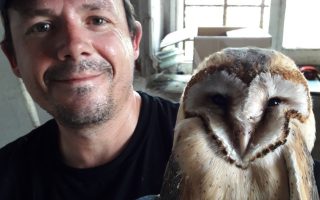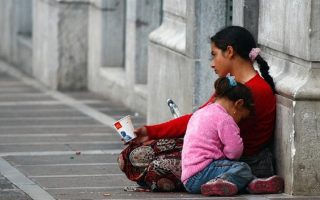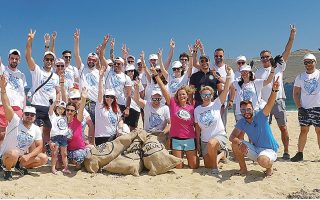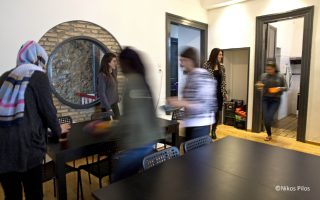Shedia, a life raft for the down and out since 2013
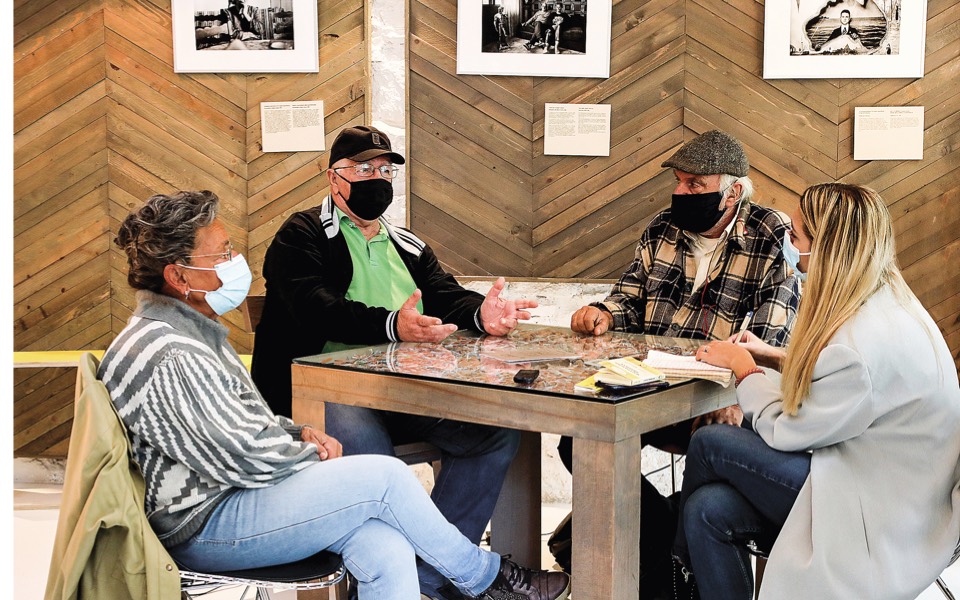
Dimitra Piangou decided to take her own life on the same day that she was served at work with a court order instructing her that both her business and her home were being put up for auction. “My entire existence disappeared that same night,” she says.
She went up to the roof and was about to step off the edge when one of her two dogs, wanting to play, pulled at her trouser leg, bringing her back from the abyss. She was homeless within a week and spent two months sleeping rough on city benches. In the best case, people would walk past and ignore her; in the worst, they would look at her with disdain.
“I felt extraneous,” she says, reminiscing on that time. That changed when she found Shedia (Life Raft), Greece’s first street magazine sold by and in aid of homeless and jobless people.
“I had heard that Shedia never turns away someone looking for a job,” says Piangou, who contacted the group’s head of sales in 2013 – shortly after the magazine first began in February of that year – asking for work. He told her he’d get back to her with an answer in four or five days. “Those days were torture, not just because of the anxiety, but also because of the practical problems of being homeless, being hungry and having two dogs to take care of. The situation was dire and I was already having blackouts because of hunger.”
Piangou became one of Shedia’s first salespeople and even though she was desperate for a job, she was also embarrassed at the beginning. “I was scared that people would laugh at me, or insult me,” she says, remembering how most people were inquisitive about the magazine and kind instead. By 2015, the monthly magazine had an avid following of readers who kept their eyes open for the red vests worn by its vendors at key points all over Athens. “It gave me warmth,” Piangou says.
Stathis Papanastasiou, 71, lived in the leafy northern Athens suburb of Holargos with his mother until he ended up homeless and poor after her death. He had done all sorts of jobs in the past – from soccer player and casino dealer to working in the merchant marine – and stayed in a shelter for several years after he became homeless. He had to wait nearly six months for a job at Shedia because of demand and remembers his first posting, six years ago, at Rizari Park, near the Evangelismos metro station. People would wish him “Good morning” and “Hang in there” every day. “I saw it as liberation from social isolation. It was something I had never felt before,” he tells Kathimerini during an interview at the restaurant of Shedia Home, a cultural center run by the magazine in downtown Athens.
“I started feeling visible as soon as I started selling the magazine,” says Michalis Samolis, 63, echoing the feeling of isolation and invisibility expressed by many homeless people.
Samolis lived on the street for 42 days; he tried to kill himself twice. His ordeals began in 2012 when his truck – and means of sustenance – was stolen. Even though he was just 55 years old, his all-white hair made him look older, making finding a job that much harder. “They’d turn me down as soon as they saw me. It was awful,” he says. After a year without work, he gradually ate through his saving and ended up on the street, his worldly belongings packed into six boxes. After 42 days sleeping rough, he got a spot at the City of Athens homeless shelter – where he still lives today. He was told about Shedia by another resident at the shelter. Samolis had been impressed to see him eating food like chicken and pizza. “He took me by the hand and changed my life,” he remembers.
The seven months waiting for an opening were torture and he’d drop by the magazine’s offices all the time to ask whether there was any news. “What makes you think that your needs are greater than all the other people waiting for a position?” he was told one day by Christos Alefantis, the founder of Shedia. Once he got the job, he understood the truth of those words. “He was right, because we’re all in the same boat.”
Samolis’ first posting was Monastiraki Square but he was afraid of being seen by friends or family who didn’t know he was homeless. “I hadn’t come to terms with it yet,” he admits. Within the first day, he sold all 10 of the magazine Shedia gives its new salespeople without charge. It was exhilarating.
“I made 30 euros, I had money in my pocket for the first time in a very long time,” he remembers, stressing that many homeless people are abandoned by their friends and family – as was the case with all three of our subjects. Samolis, who still lives at the municipal shelter, says that he has never seen any friends from the past or family at any of the funerals he has been to in the past few years for fellow residents.
The ceiling of the Shedia Home restaurant is decorated with 50 paper houses representing magazine sellers who are no longer homeless, explains Alefantis. Piangou and Papanastasiou are among them. I ask Samolis if he is also looking forward to “becoming a paper house.” He says he’s thought about leaving the shelter but is afraid of ending up on the street again and then having to wait another two years for a spot.
Piangou lives in an 85-square meter apartment in the northern suburb of Nea Ionia and pays just 29 euros a month in rent. It belongs to a pair of Shedia readers who befriended her after buying the magazine from her several times.
“At Shedia, like at sea, it’s the rescues that matter,” says former seaman Papanastasiou, who now lives in a small apartment he found through the magazine. A reader recently helped him out by paying his water bill.
Shedia, he tells Kathimerini, helped him discover the humanity in people and regain his dignity. “There are no better schools that the street and Shedia,” he says.
Lockdown woes
The lockdown presents a whole new set of challenges for Shedia’s sellers, as they are not allowed to work. Apart from the obvious financial difficulties this creates, it also creates a vacuum in other areas.
For Dimitra Piangou, not going to Shedia is like missing out on “half my life.” “I miss the contact with all the people,” says Michalis Samolis. “Marginalized people live for contact with others. That’s what social inclusion is all about,” says Stathis Papanastasiou.
How do they spend their days in lockdown? Papanastasiou plays chess on his computer, which doesn’t have an internet connection, and watches old Greek movies on television. Piangou reads and looks after her plants. “I have 25 plants now,” she smiles. Samolis is a founding member of social support group Hopeaholics and spends his days organizing webinars and free coaching for “people who need hope.”
I ask them what Shedia has given them, apart from a means of earning money. “It gave me love,” says Piangou. “I never would have thought that people I just met would want to help me change my life. I thank the readers and the founder from the bottom of my heart for helping us get our lives back.”
For Papanastasiou, Shedia showed him “the finest human virtues.” “Right at the beginning, Christos Alefantis asked us if we teared up. This happened to me a lot for the first two, three years. I was often shocked by people’s kindness.”
Samolis describes himself like a “shipwreck survivor abandoned on an island” and Shedia as the vessel that took him to “a magical world.” “I changed as a person, became better, started thinking about others. I realized that I had been rich before, just didn’t know it. I only understood this when I started working at Shedia and could once more buy a packet of cigarettes, two souvlaki and a beer. Happiness is in the little things and life never stops – only when you close your eyes.”
Copies of Shedia will be distributed with Kathimerini’s Greek edition on Thursday. All the proceeds from the newspaper’s sales on Thursday will go to the magazine.

